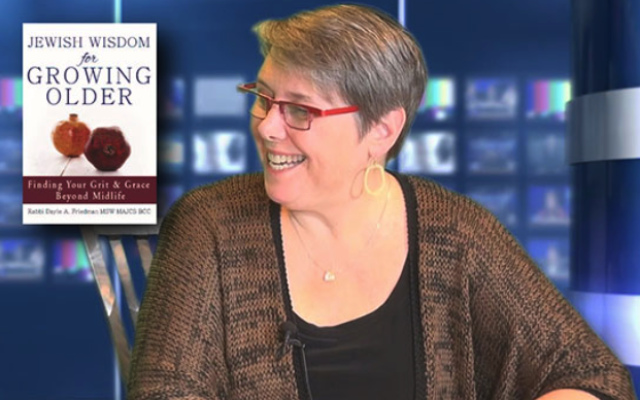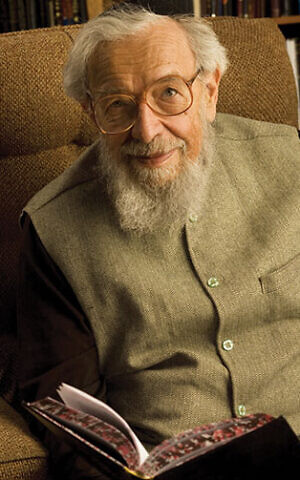Bet Haverim Rabbi Advocates Conscious Aging
Rabbi Dayle Friedman feels that synagogues, in particular, can help seniors recognize their value to the community.
As Rabbi Dayle Friedman completes her year as interim rabbi of Congregation Bet Haverim, she takes a moment to reflect on all that she’s done to make older members of the congregation feel that they have an important role to play.
The rabbi, who has devoted much of the last 40 years to writing about and working with seniors, is the founding member of Hiddur: The Center for Aging and Judaism at the Reconstructionist Rabbinical College near Philadelphia, Penn. She feels that synagogues, in particular, can help seniors recognize their value to the community.
“I think we have a big challenge, which is to tap the talents of people who are growing older. You know, as a society, we can’t think that people are done when they maybe leave a full-time working life at 65 or 70. We need to encourage individuals, as they age, to see that there are more chapters to be written in their lives,” Friedman said.
During the past year, the rabbi has worked to integrate the contribution of seniors into the everyday life of the synagogue, featuring them in Shabbat and holiday observances and creating more networking opportunities.
Friedman also put together a seminar to encourage what some have called conscious aging. While there has long been an interest in making the aging process a more spiritual endeavor, the organized movement to do so got a substantial boost in the mid-1990s with the publication of “From Age-ing to Sage-ing: A Revolutionary Approach to Growing Older” by Rabbi Zalman Schachter, who later added the word Shalomi to his name. The word, derived from the Hebrew term for peace, was said to stem from his devotion to working for peace in both its social and personal dimensions.

In the book, first published when Schachter was in the process of reflecting on his own aging process, the rabbi defined his conception of elders as “wisdom-keepers” and “pioneers in consciousness who practice contemplative arts from our spiritual traditions to open up greater intelligence for their late-life vocation.”
Schachter, who was ordained in the tradition of Lubavitch Hasidism and became an early emissary for the Chabad movement, later left to become a professor of comparative religion. He wrote extensively about the need to refashion Jewish religious teachings to reflect changing times.
His final break with the Chabad movement came in 1962, after using LSD to enlarge the dimensions of his spiritual experience. Over 30 years later, he advocated a project of inner growth that emphasized the use of meditation, journal writing and making an inventory of personal challenges in order to come to terms with our mortality.
Schachter founded ALEPH: Alliance for Jewish Renewal, which initially sponsored his eldering seminars, as well as a number of other innovative approaches to Jewish practice. Friedman, who first met Schachter when she began her chaplaincy work at the Philadelphia Geriatric Center, has since written four books on the subject of aging. She has worked with seniors in her congregation on LaVista Road to, as she put it, “look back in order to change forward,” to complete the unfinished business in our lives.

“Whether it’s relationships or it’s pieces of brokenness or it’s dreams that you didn’t get to pursue, we need to be able to look at that. We need to do whatever kind of healing work and forgiveness work and then listen for what calls us to the next chapter of life.”
Carrying Rabbi Friedman’s efforts forward at the synagogue is Elizabeth Cohen, a longtime congregant, who is presently facilitating a series of sage-ing sessions there. Cohen, who practices what she teaches, became a spiritual director two years ago, at the age of 76. She is working with a group of older adults as part of her mentoring program she is completing.
Cohen, who first met Schachter in the 1980s, when the rabbi was first exploring his ideas on growing older, has found the work to be very personally rewarding.
“Years ago, when I first began working with this process, it really helped me frame and reframe and recontextualize what has been a very difficult personal experience. It’s really given me a different window to view some of the mistakes I had made in life and to step forward into the future with a lighter heart.”
Friedman is planning to take some time off to write and reflect on the past year and to search for what comes next in her life as she winds up her year at Bet Haverim and moves back to her home in Philadelphia.
“I spent the first part of my career working directly with very old, sick people. And then I spent the next part of my career talking and writing and teaching. And here I am, becoming a congregational rabbi later in my life and completing this new challenge, which I have loved. So, I think I have discovered that I have more acts in me than I thought I did.”
- Seniors
- Senior Living
- Healthcare
- Health Care
- Bob Bahr
- Rabbi Dayle Friedman
- Congregation Bet Haverim
- Aging
- gerontology
- Hiddur
- The Center for Aging and Judaism at the Reconstructionist Rabbinical College
- networking
- Spirituality
- sageing
- Rabbi Zalman Schachter
- Lubavitch Hasidism
- Chabad
- LSD
- ALEPH: Alliance for Jewish Renewal
- Philadelphia Geriatric Center
- geriatrics




comments